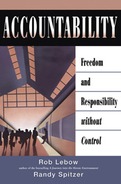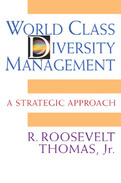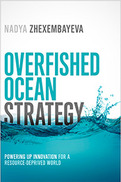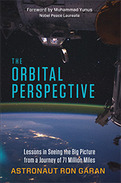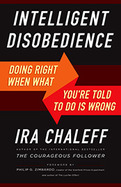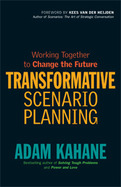2002
- Coauthored by Rob Lebow, author of the bestsellers A Journey into the Heroic Environment (over 220,000 copies sold) and Lasting Change (over 75,000 copies sold)
- Presents a more effective and humane alternative to "control-based" management practices-the only option that most organizations think they have
- Real-life examples reveal the benefits of this new approach to management
R. Roosevelt Thomas begins by laying out his Four Quadrant model, which encompasses all core diversity strategies: managing workforce demographic representation, managing demographic relationships, managing diverse talent, and managing all strategic diversity mixtures. He analyzes the goals, motives, approaches, accomplishments, and challenges associated with each quadrant, as well as the paradigm or mindset that lies behind each quadrant's express purpose.
Having laid out this broad range of strategies, Thomas shows how to realize them through the Strategic Diversity Management Process™, by far the most effective method for implementation. A detailed case study of CEO Jeff Kilt—a fictional composite of the many executives Thomas has worked with—effectively illustrates the complexities encountered when working with each of the Four Quadrant strategies in the real world.
This book offers a comprehensive blueprint that will enable leaders to address any diversity issue (not just race or gender) in any setting, anywhere in the world. Most important, it proves that a world-class standard of diversity management is indeed a possible and achievable goal.
-
Copublished with the American Society of Association Executives (ASAE)
-
Advances the field by providing a unified framework and terminology and spelling out exactly what needs to be done to build world-class diversity management capability
-
Identifies optimal implementation approaches that can be used anywhere, anytime
With demographic shifts and globalization transforming the nature of relationships, interactions, and decision making, excellence in diversity management is more important than ever. However, the field of diversity has no established standard for evaluating what constitutes best practices, nor has there been any agreement on what the most fundamental philosophies, principles, and concepts areuntil now. In this pioneering book R. Roosevelt Thomas, one of our most distinguished diversity theorists and practitioners, proposes a framework that will enable the development of a truly world-class diversity management capability. It was the development of such standards in manufacturing that enabled companies to strategically pursue excellence in this area.
A world-class approach to diversity management must be applicable anywhere in the world, be able to address any possible issue, facilitate comparison of different concepts and practices, and focus on the entire field of diversity rather than specific dimensions such as race or gender. These requirements are amply met by Thomass Four Quadrant model and his Strategic Diversity Management Process.
Thomas first analyzes each of four quadrantsmanaging workforce demographic representation, managing demographic relationships, managing diverse talent, and managing strategic mixturesexploring the goals, motives, approaches, accomplishments, and challenges associated with each. And he reveals the unrecognized paradigm or mind-set that lies behind each quadrants express purpose.
Once he has laid out the broad range of diversity management strategies, Thomas discusses how to realize them. He offers an overview of the Strategic Diversity Management Processby far the most effective framework for implementation. He also examines the on-the-ground dynamics of implementing each of the strategies and their associated paradigms by incorporating a case study of a CEO, a composite of the many executives Thomas has worked with.
On space walks and through windows, Garan was struck by the stunning beauty of the Earth from space but sobered by knowing how much needed to be done to help this troubled planet. And yet on the International Space Station, Garan, a former fighter pilot, was working work side by side with Russians, who only a few years before were “the enemy.” If fifteen nationalities could collaborate on one of the most ambitious, technologically complicated undertakings in history, surely we can apply that kind of cooperation and innovation toward creating a better world. That spirit is what Garan calls the “orbital perspective.”
Garan vividly conveys what it was like learning to work with a diverse group of people in an environment only a handful of human beings have ever known. But more importantly, he describes how he and others are working to apply the orbital perspective here at home, embracing new partnerships and processes to promote peace and combat hunger, thirst, poverty, and environmental destruction. This book is a call to action for each of us to care for the most important space station of all: planet Earth. You don't need to be an astronaut to have the orbital perspective. Garan's message of elevated empathy is an inspiration to all who seek a better world.
Nearly every week we read about a tragedy or scandal that could have been prevented if individuals had said no to ill-advised or illegitimate orders. In this timely book, Ira Chaleff explores when and how to disobey inappropriate orders, reduce unacceptable risk, and find better ways to achieve legitimate goals.
The inspiration for the book, and its title, comes from the concept of intelligent disobedience used in guide dog training. Guide dogs must recognize and resist a command that would put their human and themselves at risk and identify safer options for achieving the goal. This is precisely what Chaleff helps humans do. Using both deeply disturbing and uplifting examples, as well as critical but largely forgotten research, he shows how to create a culture where, rather than “just following orders,” people hold themselves accountable to do the right thing, always.
Transformative scenario planning is a powerful new methodology for dealing with these challenges. It enables us to transform ourselves and our relationships and thereby the systems of which we are a part. At a time when divisions within and among societies are producing so many people to get stuck and to suffer, it offers hope-and a proven approach-for moving forward together.


